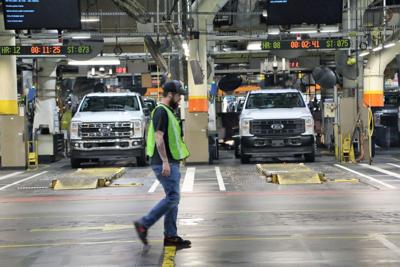LOUISVILLE, Ky. (WDRB) -- Carmakers could face higher costs and see lower sales as a result of President Donald Trump's latest tariff announcement Wednesday, a 25% hike on auto imports.
The "permanent" tariffs, which the White House expects to raise $100 billion in revenue annually, could be complicated as even U.S. automakers source their components from around the world. The tax hike starting in April means automakers could face higher costs and lower sales, though Trump argues the tariffs will lead to more factories opening in the United States and the end of what he judges to be a "ridiculous" supply chain in which auto parts and finished vehicles are manufactured across the United States, Canada and Mexico.
"This will continue to spur growth," Trump told reporters Wednesday upon announcing the tariffs.
On Thursday, it was business as usual at Bill Collins Ford on Bardstown Road in Louisville. But uncertainty looms.
"What I would tell any car buyer right now is take a deep breath and relax" said Shane Collins, general manager of Collins Auto Group. "Everything's going to be just fine."
The United States last year imported nearly 8 million cars and light trucks worth $244 billion. Mexico, Japan and South Korea were the top sources of foreign vehicles. Imports of auto parts came to more than $197 billion, led by Mexico, Canada and China, according to the Commerce Department.
Former WDRB business reporter Chris Otts, who now covers the auto industry for the Wall Street Journal, said Trump's announcement Wednesday could be "the biggest policy shock to the industry" in more than a decade.
"This is a huge deal for the auto industry, and, in Louisville, that means it's a huge job for the city, for the local economy," Otts said Thursday.
Trump has long said that tariffs against auto imports would be a defining policy of his presidency, betting the costs created by the taxes would cause more production to relocate to the United States while helping narrow the budget deficit. But U.S. and foreign automakers have plants around the world to accommodate global sales while maintaining competitive prices — and it could take years for companies to design, build and open the new factories that Trump is promising.
Shares in General Motors fell roughly 3% in Wednesday trading. Ford's stock was up slightly. Shares in Stellantis, the owner of Jeep and Chrysler, dropped nearly 3.6%.
"The impact will be really huge and very disruptive," said Sigrid de Vries, director general of the European Automobile Manufacturers' Association. Vries and others critics say American car shoppers will also be worse off, as tariffs push prices higher.
Time will tell, but experts said higher prices could lead to slowed demand, which could impact workers at Ford's two major plants in Louisville and Toyota's Georgetown Plant. And Otts said we could see production shutdowns similar to those during the COVID-19 pandemic. Or the companies could scale back even further.
"They could say 'You know what? We've got too many cars on the ground. We don't need to make as many,'" Otts said. "Which could mean layoffs."
Foreign leaders were quick to criticize the tariffs, a sign that Trump could be intensifying a broader trade war that could damage growth worldwide.
"This is a very direct attack," Canadian Prime Minister Mark Carney said. "We will defend our workers. We will defend our companies. We will defend our country."
In Brussels, European Commission President Ursula von der Leyen expressed regret at the U.S. decision to target auto exports from Europe and vowed that the bloc would protect consumers and businesses.
"Tariffs are taxes — bad for businesses, worse for consumers equally in the U.S. and the European Union," she said in a statement, adding that the EU's executive branch would assess the impact of the move, as well as other U.S. tariffs planned for coming days.
As Trump announced the new tariffs, he indicated that he would like to provide a new incentive to help car buyers by allowing them to deduct from their federal income taxes the interest paid on auto loans, so long as their vehicles were made in America. That deduction would eat into some of the revenues that could be generated by the tariffs.
The new tariffs would apply to both finished autos and parts used in the vehicles, according to a White House official who spoke on condition of anonymity to discuss the taxes on a call with reporters. The tariffs would be on top of any existing taxes and were legally based on a 2019 Commerce Department investigation that occurred during Trump's first term on national security grounds.
Dealers say there's enough inventory in the market now to delay any price or supply impacts for at least a few months.
"Because of the inventory right now, there's a lot of good deals to be had," Collins said. "Manufacturers are again back to pre-pandemic rates and rebates and things like that."
So if you've been thinking about getting a new ride, there may be no time better than the present.
"I would say it's a fantastic time to buy," Collins said. "You know, everything on the ground right now in inventory is tariff-free, and who knows what the future holds."
Related Stories:
- Global automakers say Trump's tariffs will be painful for them and US consumers
- Trump places 25% tariff on imported autos, expecting to raise $100 billion in tax revenues
Copyright 2025 WDRB Media. The Associated Press contributed to this report. All Rights Reserved.

